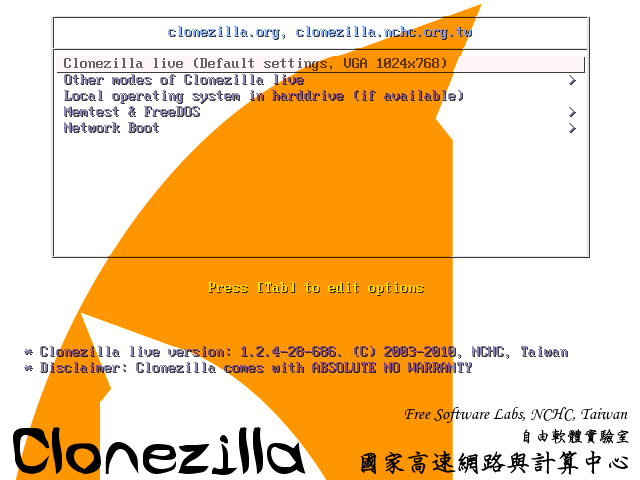|
Clonezilla
CloneZilla
CloneZilla is the Free and Open Source Software for Disk Imaging and Cloning
Clonezilla is a partition and disk imaging/cloning program similar to True Image® or Norton Ghost®. It helps you to do system deployment, bare metal backup and recovery. Two types of Clonezilla are available, Clonezilla live and Clonezilla SE (server edition). Clonezilla live is suitable for single machine backup and restore. While Clonezilla SE is for massive deployment, it can clone many (40 plus!) computers simultaneously. Clonezilla saves and restores only used blocks in the hard disk.
Features:
- Many File systems are supported: (1) ext2, ext3, ext4, reiserfs, reiser4, xfs, jfs, btrfs, f2fs and nilfs2 of GNU/Linux, (2) FAT12, FAT16, FAT32, NTFS of MS Windows, (3) HFS+ of Mac OS, (4) UFS of FreeBSD, NetBSD, and OpenBSD, (5) minix of Minix, and (6) VMFS3 and VMFS5 of VMWare ESX. Therefore you can clone GNU/Linux, MS windows, Intel-based Mac OS, FreeBSD, NetBSD, OpenBSD, Minix, VMWare ESX and Chrome OS/Chromium OS, no matter it's 32-bit (x86) or 64-bit (x86-64) OS. For these file systems, only used blocks in partition are saved and restored. For unsupported file system, sector-to-sector copy is done by dd in Clonezilla.
- LVM2 (LVM version 1 is not) under GNU/Linux is supported.
- Boot loader, including grub (version 1 and version 2) and syslinux, could be reinstalled.
- Both MBR and GPT partition formats of hard drive are supported. Clonezilla live also can be booted on a BIOS or uEFI machine.
- Unattended mode is supported. Almost all steps can be done via commands and options. You can also use a lot of boot parameters to customize your own imaging and cloning.
- One image restoring to multiple local devices is supported.
- Image could be encrypted. This is done with ecryptfs, a POSIX-compliant enterprise cryptographic stacked filesystem.
- Multicast is supported in Clonezilla SE, which is suitable for massively clone. You can also remotely use it to save or restore a bunch of computers if PXE and Wake-on-LAN are supported in your clients.
- The image file can be on local disk, ssh server, samba server, NFS server or WebDAV server.
- AES-256 encryption could be used to secures data access, storage and transfer.
- Based on Partclone (default), Partimage (optional), ntfsclone (optional), or dd to image or clone a partition. However, Clonezilla, containing some other programs, can save and restore not only partitions, but also a whole disk.
- By using another free software drbl-winroll, which is also developed by us, the hostname, group, and SID of cloned MS windows machine can be automatically changed.
Minimum System Requirements for Clonezilla live:
- X86 or x86-64 processor
- 196 MB of system memory (RAM)
- Boot device, e.g. CD/DVD Drive, USB port, PXE, or hard drive
LinuxCollections.com Notes
This is a text/menu driven interface, and certainly not as polished as the commercial options. Until you get familiar with its flow, pay close attention to the text/steps that are reasonably well documented at each screen. The images are stored in folders with many files, including a compressed data image which is typically the largest file (for normal hard drive images). This folder can then be managed separately for archiving, etc. It will not restore an image from a larger to a smaller drive (for example, if you image a 160GB hard drive, you cannot restore to an 80GB hard drive even if there is only 10GB of data on the 160GB drive).

Here is a complete list of all distributions available.
If you don't see what you're looking for, click here to let us know.
You can also make a request at our By Request page
|
Clonezilla
| |
|
Clonezilla CD 2.4.7-8 (AMD64)
Platform: AMD64, CD's: 1, USB's: 1, Catalog#: 54103, Price: US $3.79, $14.19
|
|
Clonezilla CD 2.4.7-8 (i686)
Platform: i686, CD's: 1, USB's: 1, Catalog#: 54104, Price: US $3.79, $14.19
|
|
Clonezilla CD 2.4.7-8 PAE (i686)
Platform: i686, CD's: 1, USB's: 1, Catalog#: 54105, Price: US $3.79, $14.19
|
|
|


